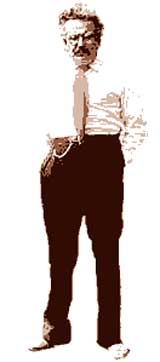|
Walter Youngest child (1892-1940)
|
| It was born the 15 of 1892 July in Berlin, where it began his studies of philosophy, that continued in Friburgo, Munich and Bern. Its academic vocation was truncated when not being approved its doctoral thesis -‘El origin of the tragedy alemaná (1928) – in the University of Frankfurt. Next to the postulates of the Marxist thought of György Lukacs, it maintained one narrow relation with the Germanic dramatist Bertolt Brecht. From Jewish origin, after the ascent of nazism to the power it fled to France, where it continued his theoretical work. Before the Nazi advance on France, in 1940 it flees with his sister to Lourdes and is able a visa to travel to the United States, facilitated by Max Horkheimer. When crossing the border franc-Spanish, is stopped by the police and ends its life (cuestionamiento of the causes of the death).
Bibliography (translations in Spanish language): Selected tests, South Ed., Buenos Aires, 1967. On the program of the |
| German thinker whose work, fragmented and incomplete, is, by its value of suggestion and projection in the present thought, one of most excellent of last century XX. From a conception defined as ‘ utopismo negativó, first from defined Marxist positions and, later, with a vision that registers in the critical spirit of the School of Frankfurt.
Youngest child analyzes the ‘ subversion of tecnologíá, that is to say, its determining relation with the art and the culture and the autonomy of the society. The direction of the designed technological development from the positions of being able accentuates the power, the control, the same sense of the innovation. The communication and the industries of the culture are present in their work, that approaches aspects like the culture of masses, the perception, the social and political function of the mechanical transmission of the knowledge, the fashions, the language, etc. The technology predefines the content, as it indicates when analyzing the cultural transformations of the cinema, or the loss of ‘ will aurá, the experience, of the experience, in the photographic reproduction. The technique directs the communication, orients it, takes it to the mass, turns it a reference instrument on the part of the dominant classes. To the time, it transforms the speech. Tecnológicá not only changes to the cognitiva experience by the ‘ experience, but that the narrative value of history, the cultural perception of the past, is degraded in the communicative fact of the news, the information, the ephemeral value of the reproduction. The taking of conscience based on the experience is replaced by the induction of an artificial or virtual construction of the reality. The temporary dimension of the narrative experience disappears in the means system, where the instantaneity of the news prevails. The value of the collective experience is diluted in the solitude of the technical consumption, in the directed induction of the ‘ experience tecnológicá. Between texts of reference on the effects of the technical reproduction of the art and the memory, the work of art at the time of its technical reproductibilidad (1936), the narrator (1936), in whom he theorizes about the values of the experience and the information, On the perception. Experience and Knowledge, etc. |

 future philosophy and other tests, Mount Avila, Montevideo, 1971. Angelus Novus, Edhasa, Barcelona 1971. Iluminaciones, Taurus, 3 vols. Madrid.1971-1975. Interrupted speeches, Taurus, Madrid.1973. Reflections on infantile, young children, toys, books and education, New Vision, Buenos Aires, 1974. Haschisch, Taurus, 1974. For a critic of the violence, Edhasa, Madrid, 1977. Childhood in Berlin towards 1900, Madrid, Abundant spring, 1982. For a critic of the violence, It awards, Mexico, 1982. One way street, Abundant spring, Madrid, 1987. Correspondence 1933-1940 WB/G.Scholem, Taurus, Madrid, 1987. Newspaper of Moscow, Taurus, Madrid, 1988. Demónico Berlin, Icaria, Barcelona, 1988. Writings, New Vision, Buenos Aires, 1990. The origin of the German baroque drama, Taurus, Madrid.1991. For a critic of the violence and other tests, Taurus, Madrid, 1991. The metaphysics of youth, Paidós, Barcelona, 1993. Autobiographical writings, Publishing Alliance, Madrid.1996. Two tests on Goethe, Gedisa, Barcelona.1996.
future philosophy and other tests, Mount Avila, Montevideo, 1971. Angelus Novus, Edhasa, Barcelona 1971. Iluminaciones, Taurus, 3 vols. Madrid.1971-1975. Interrupted speeches, Taurus, Madrid.1973. Reflections on infantile, young children, toys, books and education, New Vision, Buenos Aires, 1974. Haschisch, Taurus, 1974. For a critic of the violence, Edhasa, Madrid, 1977. Childhood in Berlin towards 1900, Madrid, Abundant spring, 1982. For a critic of the violence, It awards, Mexico, 1982. One way street, Abundant spring, Madrid, 1987. Correspondence 1933-1940 WB/G.Scholem, Taurus, Madrid, 1987. Newspaper of Moscow, Taurus, Madrid, 1988. Demónico Berlin, Icaria, Barcelona, 1988. Writings, New Vision, Buenos Aires, 1990. The origin of the German baroque drama, Taurus, Madrid.1991. For a critic of the violence and other tests, Taurus, Madrid, 1991. The metaphysics of youth, Paidós, Barcelona, 1993. Autobiographical writings, Publishing Alliance, Madrid.1996. Two tests on Goethe, Gedisa, Barcelona.1996.